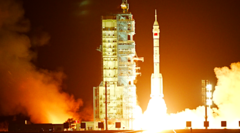Upon launch, jubilation filled the air as hundreds gathered to celebrate the event at the Jiuquan Satellite Center in Gansu. The rocket's dramatic ascent lit up the Gobi Desert, an emblematic display of national pride. Cai Xuzhe, the mission's veteran pilot, highlighted the youthful energy of his younger crewmates, born in the 1990s, saying it rejuvenated his own spirit.
China describes this mission and the crew, consisting of highly-trained individuals such as Song Lingdong alongside Wang, as a vital step in cementing its status as a major player in space exploration. With plans for 100 launches this year alone, Beijing aims to outpace the United States in this new space race, with both countries having set their sights on the Moon's potential resources.
Following earlier achievements like retrieving samples from the Moon's far side and sending a rover to Mars, this latest mission symbolizes China's growing space ambitions. However, the U.S. has voiced concerns, viewing China's advancements with suspicion and suggesting a possible military overlay to their space program.
While China aspires to promote peaceful uses of space, analysts note that the true competition now revolves around who can claim and control lunar resources, estimated to be of immense value. Amidst the celebrations, significant challenges lie ahead for China’s space ambitions, including the technology needed to successfully execute a Moon landing, amid the tightening timeline and potential geopolitical tensions.
Despite reported restrictions on international access during the event, China remains determined to maintain its momentum in space, continually pushing boundaries for innovation and exploration while fostering a sense of national pride in its growing capabilities.
The mission reinforces a broader narrative of national resolve with critics and analysts worldwide closely monitoring developments in the increasingly competitive arena of space exploration.
China describes this mission and the crew, consisting of highly-trained individuals such as Song Lingdong alongside Wang, as a vital step in cementing its status as a major player in space exploration. With plans for 100 launches this year alone, Beijing aims to outpace the United States in this new space race, with both countries having set their sights on the Moon's potential resources.
Following earlier achievements like retrieving samples from the Moon's far side and sending a rover to Mars, this latest mission symbolizes China's growing space ambitions. However, the U.S. has voiced concerns, viewing China's advancements with suspicion and suggesting a possible military overlay to their space program.
While China aspires to promote peaceful uses of space, analysts note that the true competition now revolves around who can claim and control lunar resources, estimated to be of immense value. Amidst the celebrations, significant challenges lie ahead for China’s space ambitions, including the technology needed to successfully execute a Moon landing, amid the tightening timeline and potential geopolitical tensions.
Despite reported restrictions on international access during the event, China remains determined to maintain its momentum in space, continually pushing boundaries for innovation and exploration while fostering a sense of national pride in its growing capabilities.
The mission reinforces a broader narrative of national resolve with critics and analysts worldwide closely monitoring developments in the increasingly competitive arena of space exploration.



















